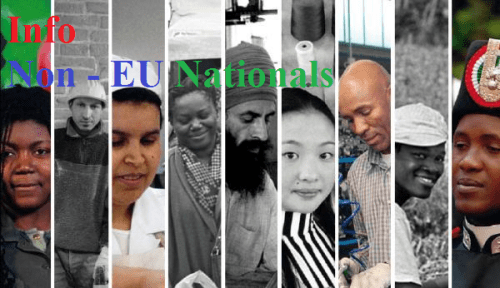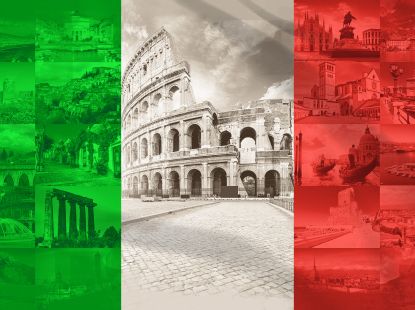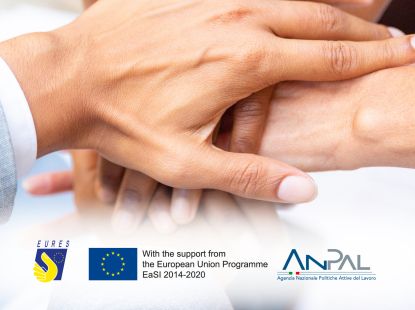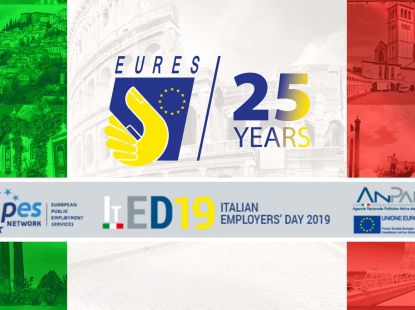
Info Non-EU nationals EURES Italy
About the organisation

"WORK IN ITALY"
Work in Italy is a Presidium created by the EURES Italy to provide adequate information and guidance to those who intend to have work experience in Italy for short or long term.
This Presidium is dedicated to basic and first level information for EU nationals and Non-EU nationals interested in working in Italy.
If you are not an EU citizen or EAA continue to follow the information on Info Non-EU nationals
Info Non-EU nationals
This is exclusively an "Info Point" service.
It provides general information for Non-EU nationals about living and working conditions in Italy.
In order to be able to work in Italy and/or other European countries you will still have additional legal obligations and administrative procedures to go through to get access to the European labour market – and you’re not entitled to EURES mobility schemes.
As it is reiterated by the European Commission: Employment, social affairs and inclusion for non-EU citizens: “The freedom to move to another EU country to work without a work permit is a right for EU nationals”.
Non-EU nationals may have the right to work in an EU country or to be treated equally with EU nationals as regards conditions of work. These rights depend on their status as family members of EU nationals and on their own nationality. Due to complex immigration procedures, employers may as well decide not to go through your application.
Many of EURES' services (in particular EURES on-line services) are freely available for any user with access to the web. If you already live and work in the EEA territory or Switzerland, you can contact a local or regional EURES Adviser to get advice.
However, finding a job via EURES does not change the legal obligations and administrative procedures that may apply to non-EU citizens.
If you intend to move from a non-EEA country (except Switzerland) to live and work in the European Economic Area or Switzerland, often your own Ministry of Foreign Affairs can provide you with information on legal requirements to move abroad or refer you to useful information centres.
This Info point (prepared by EURES Italy) is dedicated to basic and first level information for non-EU citizens interested in working in Italy.
We reiterate that the Italian Authority responsible for the entry and stay of non-EU citizens is the Ministry of the Interior.
For more information and insights, follow the Guides - factsheets:
WORK IN ITALY – Info NON-EU nationals
Definitions of Terms - Non-EU Countries
Framework of entry - Entry into Italy
Framework of entry - Quotas Flow Decrees
Entrance for tourism
Entries in Italy for study
Entrance for scientific research
Entrance for medical treatments
Entries in Italy for reunification
Entries in Italy for work
Entries in Italy for self-employment
Entries in Italy for internships
Angraphic residence- Non-EU
Residence Permit – Permesso di Soggiorno
Residence Permit - Long-term
Recruitment resident in Italy
The rights of foreign workers
Workplace injuries
Banking services for Foreigners
Leases and Rentals
Health Care for Foreign Citizens – STP Card
Driving - Licence_NON-EU
Tax identification number - Non-EU
Incomes and taxation
SPID - the Public Digital Identity System
VAT Number
Health Care for Foreign Citizens – TEAM Card
Seasonal Jobs in Italy
Seasonal Jobs in Italy
The Macro sectors of Seasonal Job in Italy
Trends in the Agricutural Economy
Entry in Italy for Seasonal Work - EU Countries
Entry in Italy for Seasonal Work - Non-EU Countries
Practical guide for foreign Workers and Employers
Three-year Plan to tackle labour exploitation and unlawful recruitment in agriculture
National Guidelines on identification, protection and assistance to victims of labour exploitation in agricolture
NEW- Important information for Italian companies in the sectors are Road Transport for third parties, construction, tourism-hotel, mechanics, telecommunications, food, shipbuilding, passenger transport by bus, fishing, hairdressers, electricians and plumbers.
Entry into Italy for subordinate work, including seasonal work, and self-employment, must take place within the framework of the entry quotas established in the decrees - the so-called 'decree-flows' - which are periodically issued by the President of the Council of Ministers on the basis of the criteria indicated in the three-year planning document on immigration policies.
These procedures have been managed electronically for several years now, so it will be sufficient to connect from your computer, or make use of the support of the numerous authorized bodies or patronages, to carry out the entire practice.
The Prime Ministerial Decree of 27 September 2023 "Planning of the flows of legal entry into Italy of foreign workers for the three-year period 2023-2025" authorizes the entry into Italy during the three-year period of 452 thousand foreign citizens, for seasonal and non-seasonal subordinate work and self-employment.
A total of 136,000 non-EU workers will be able to enter Italy regularly thanks to the 2023 flows decree: 52,770 entries for non-seasonal subordinate work, 680 entries for self-employment and 82,550 entries for seasonal subordinate work.
Starting from 9:00 a.m. on October 30, 2023 and until November 26, 2023, the application for pre-filling application forms will be available at https://portaleservizi.dlci.interno.it/.
The system will be available from 08:00 to 20:00 every day of the week, including Saturdays and Sundays.
Applications may be definitively transmitted exclusively by the usual electronic means, starting from:
- 9:00 a.m. on 2 December 2023 (sixtieth day from the date of publication in the Official Gazette, art. 8, paragraph 1, letter a) of the D.P.C.M.) for the entrances referred to in art. 6, paragraph 3, letter a), for non-seasonal work;
- 9:00 a.m. on 4 December 2023 (sixty-second day from the date of publication in the Official Gazette, art. 8, paragraph 1, letter a) of the D.P.C.M.) for the entrances referred to in art. 6, paragraph 3, letter b) and paragraphs 4, 5 and 6;
- 9:00 a.m. on 12 December 2023 (seventieth day from the date of publication in the Official Gazette art. 8, paragraph 1, letter c) of the D.P.C.M.) for the entrances referred to in art. 7;
A specific share is also reserved for the family and social-health care sector: 9,500 units in 2023, 9,500 units in 2024 and 9,500 units in 2025.
All applications can be submitted until December 31, 2023. If the application is not included in the quota according to the chronological order of submission, the employer will see the following notice on the ALI portal "The file is currently not in quota".
For the electronic submission of applications on the https://portaleservizi.dlci.interno.it/ website, it is necessary to have a SPID or CIE identity.
To learn more about Quotas Flow Decrees click here:
Framework of entry - Quotas Flow Decrees
Hot jobs
Framework of entry: Self-employment and Subordinate work
How to enter Italy for self-employment
Non-EU nationals residing abroad who intend to engage in “Not regulated” selfemployment in Italy must meet the same legal requirements as Italian citizens who undertake an individual business, and refer to the rules outlined by the Immigration Quota (Art. 26th Legislative Decree no. 286/98).
The application must be completed online on the Ministry for the Interior's website within the annual deadline set by the Immigration Quota.
When applying for the “nulla osta”, the non-EU nationals must be in possession of the license documentation or authorsation for the business activity he/she wishes to carry out. Alternatively, he/she must have enrolled in the Chamber of Commerce and proof of this is to be presented to the Police authorities.
Following on from the issiung of the nulla osta, the worker can apply for an entrance visa for autonomous work at the Italian Diplomatic Representative in his/her country of origin.
How to enter Italy for work?
Entering Italy for reasons of subordinate work (including seasonal work) and self-employment is possible only within the framework of entry quotas established annually in accordance with the Flow Decrees.
Quotas in detail
For the three-year period 2023-2025, a total of 452,000 foreign citizens will be admitted to Italy for seasonal and non-seasonal employment and self-employment, divided as follows:
136,000 foreigners for the year 2023
151,000 foreigners for the year 2024
165,000 foreigners for the year 2025.
What is the procedure to be followed?
The main actor in this process is the employer!
An Italian employer or a foreign employer legally residing in Italy.
Which procedure must be followed to be hired by an employer in Italy?
The sending by an employer, of the request for a nulla osta to hire a non-EU worker is the starting point for the entire procedure.
The application for a nulla osta to work can be submitted through the special online platform, only after the publication in the Gazzetta Ufficiale of the annual decree on the programming of flows and according to the procedures indicated in ministerial circulars.
The application is sent to the Single Desk for Immigration (Sportello Unico per l'Immigrazione - SUI), which issues the nulla osta to work on condition that the request for employment made by the employer:
- falls within the quota established annually by the flows decree;
- that no Italian/ EU/ non-EU worker registered in the employment lists or registered as unemployed is available to accept that particular employment;
- that there are no obstacles by the Police Headquarters;
- that the contractual conditions required by current legislation to recruit foreign workers are met.
SUBMISSION OF APPLICATIONS
The deadlines for submitting applications for nulla osta set by providing different time for the submission of applications for non-seasonal and seasonal work.
In particular, for 2024, requests can be sent, until 31 December 2024, starting at 9.00 a.m. on:
5 February for non-seasonal employees who are citizens of countries that have cooperation agreements with Italy. These are, in particular, citizens of the following countries: Albania, Algeria, Bangladesh, Bosnia and Herzegovina, South Korea, Côte d'Ivoire, Egypt, El Salvador, Ethiopia, Philippines, Gambia, Georgia, Ghana, Japan, Jordan, Guatemala, India, Kyrgyzstan, Kosovo, Mali, Morocco, Mauritius, Moldova, Montenegro, Niger, Nigeria, Pakistan, Peru, Republic of North Macedonia, Senegal, Serbia, Sri Lanka, Sudan, Tunisia, Ukraine;
7 February for other non-seasonal employees, citizens of other countries with whom cooperation agreements on migration come into force during the three-year period, and for domestic workers
12 February for seasonal workers.
Employment Sectors
The sectors in which employees can be admitted to the national territory have increased compared to previous years and are as follows:
- road haulage for third parties and passenger transport by bus. In this case, the clearance can only be issued in favour of citizens of those countries that issue driving licences equivalent to the required category and convertible in Italy based on reciprocity agreements in force (currently existing with Albania, Algeria, Morocco, Moldova, Republic of Korea, Republic of North Macedonia, Tunisia and Ukraine)
- tourism-hotel sector
- mechanics
- telecommunications
- food sector
- shipbuilding
- fishing
- hairdressing, electricians and plumbers
- family and socio-medical assistance
- seasonal tourist-hotel sector.
The 'agricultural' employment sector also includes applications relating to the entry of non-EU seasonal/multi-year workers classified as 'flower and plant nursery workers' and 'animal breeding personnel', as provided for by the collective bargaining agreement for the sector.






